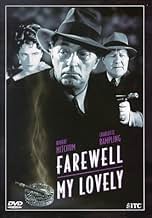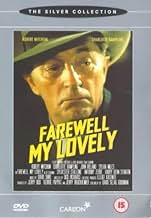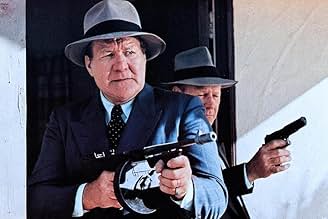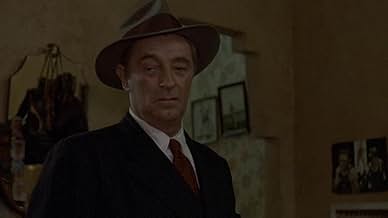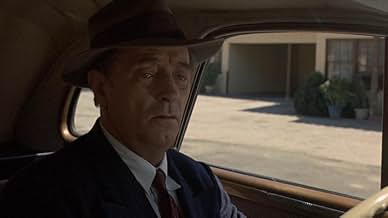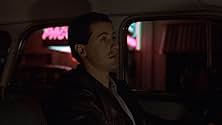NOTE IMDb
7,0/10
10 k
MA NOTE
Le détective privé de Los Angeles, Philip Marlowe, est embauché par le détenu en liberté conditionnelle Moose Malloy pour retrouver sa petite amie Velma, ancienne danseuse de boîte de nuit.Le détective privé de Los Angeles, Philip Marlowe, est embauché par le détenu en liberté conditionnelle Moose Malloy pour retrouver sa petite amie Velma, ancienne danseuse de boîte de nuit.Le détective privé de Los Angeles, Philip Marlowe, est embauché par le détenu en liberté conditionnelle Moose Malloy pour retrouver sa petite amie Velma, ancienne danseuse de boîte de nuit.
- Réalisation
- Scénario
- Casting principal
- Nommé pour 1 Oscar
- 1 victoire et 3 nominations au total
Jimmy Archer
- Georgie
- (as Jimmie Archer)
Avis à la une
Farwell My Lovely is much closer to the novel than the other previous adaptation Murder My Sweet from the 40's. This film is also a better film, but it has some flaws and seems like it was just made a decade too late. For starters let's talk Phillip Marlowe, Raymond Chandler's anti-hero. I liked Bogart's Marlowe a whole lot and find his portrayal my favorite, yet Mitchum does a very credible even superior job as the private eye working within his own code of ethics. He says the narration lines wonderfully and he looks 1940's. He, if the lighting is really good which fortunately for him isn't too terribly often, looks a little worse for wear at times, but I believe he carries the role off both in spirit and physicality. The rest of the cast is equally good with some spot-on character acting from the likes of John Ireland, Anthony Zerbe, and Sylvia Miles giving a really good performance as a lush and one time lounge singer. The story, like much of Chandler's work,is surprisingly complex as Marlowe is brought into the case of a missing girlfriend of an ex-con and another case of abducted jade jewelry - both cases melding together and bringing about a rather astounding conclusion. Director Dick Richards conveys the atmosphere of the time period impeccably. Farewell My Lovely is a solid mystery with a chance to see some first-rate acting by an American screen legend Robert Mitchum.
The choice of Mitchum for the lead role really did work. The novel suggest a tired Marlowe, who has had enough of being "detective to the stars". He wants to get out of his seedy little life, and change things, but instead, he gets wrapped up in another case. Mitchum's hang dog expression and tired wise guy act sums up the depression of the fallen hero. This is not the smooth talking Bogart, not the finely clipped and smooth Powell, but a harder, more experienced Marlowe, a man more aware of his own downfall. As he says to knulty, what he need is a nights sleep, what he needs is another drink. After watching this truly excellent recreation of late forties LA, I'm not sure that I couldn't agree with him.
Ah yes, and Charlotte Rampling and the sometime Thelma really was "cuter than lace pants"
Ah yes, and Charlotte Rampling and the sometime Thelma really was "cuter than lace pants"
The work of Raymond Chandler experienced a resurgence in the 1970s, thanks to Robert Altman's 'The Long Goodbye (1973)' and Roman Polanski's very Chandler-ish 'Chinatown (1974).' The waning career of Robert Mitchum was also revived by two Chandler adaptations, 'Farewell, My Lovely (1975)' {previously filmed by Edward Dmytryk as 'Murder, My Sweet (1944)'} and 'The Big Sleep (1978) {previously filmed by Howard Hawks}. Though outside the traditionally-accepted film noir period (approx. 1940-1958), the 1970s provided an ideal climate for a resurgence of the style. The demise of the Production Code in the 1960s had allowed filmmakers the freedom to explore more explicit themes, usually implying an increase in language, violence and nudity. Chandler's novels – which typically dabbled in themes of prostitution, homosexuality and pornography – could now be adapted faithfully without the threat of censorship, though fortunately, in the case of this particular film, director Dick Richards doesn't overdo the sleaze. The source material is one of the few Marlowe novels I haven't read, but 'Farewell, My Lovely' nevertheless seems a loyal interpretation of the author's style.
Philip Marlowe is the sort of role that Robert Mitchum would have nailed in the 1950s, when he always seemed to feel old and weary without actually looking it. Nevertheless – though he lacks the cocky vigour of Dick Powell, or the invincibility of Humphrey Bogart – the aging Mitchum does communicate what is perhaps Marlowe's most defining characteristic: that of a disillusioned, world-weary private dick looking for something in this world, anything, worth fighting for. In his latest case, Marlowe is hired by fearless lug Moose Malloy (Jack O'Halloran) to find his girlfriend Velma, who vanished while Malloy was serving a prison sentence. As always, what had initially seemed a straightforward assignment soon gets Marlowe embroiled in a complex patchwork of deceits, murders and double-crossings. Crucial to the mystery is Charlotte Rampling (emulating Lauren Bacall) as the adulterous wife of an old millionaire, and Oscar-nominated Sylvia Myles as an alcoholic performance artist. Also look out for small roles from Harry Dean Stanton as Det. Rolfe, and Sylvester Stallone as a lustful thug.
'Farewell, My Lovely' does a fine job of translating Chandler's pessimistic vision of urban decay and human depravity. The 1940s adaptations are, of course, superbly entertaining, but most of them – particularly 'The Big Sleep (1946)' and 'Lady in the Lake (1947)' – are clearly filmed on a pristine studio set, somewhat offsetting the grittiness of Chandler's characters and plot. Richards' film, to his credit, is incredibly ugly. Aside from Helen Grayle, whose sprawling mansion suffers next to Buckingham Palace, most of Marlowe's witnesses live in appalling squalor; even his own office is drab and bathed in shadow. Yet, despite the unpolished milieu, 'Farewell, My Lovely' most assuredly has a heart. Marlowe's wordless interactions with the son of a penniless musician help us see beneath the detective's front of indifference, hinting at his admiration for the honest working-class, and his fervent distaste towards the decadence of the wealthy. When offered his own wealth, Marlowe unthinkingly surrenders it to someone he deems more worthy, a touching but cheerless ending to a film steeped in the unpleasantness of human existence.
Philip Marlowe is the sort of role that Robert Mitchum would have nailed in the 1950s, when he always seemed to feel old and weary without actually looking it. Nevertheless – though he lacks the cocky vigour of Dick Powell, or the invincibility of Humphrey Bogart – the aging Mitchum does communicate what is perhaps Marlowe's most defining characteristic: that of a disillusioned, world-weary private dick looking for something in this world, anything, worth fighting for. In his latest case, Marlowe is hired by fearless lug Moose Malloy (Jack O'Halloran) to find his girlfriend Velma, who vanished while Malloy was serving a prison sentence. As always, what had initially seemed a straightforward assignment soon gets Marlowe embroiled in a complex patchwork of deceits, murders and double-crossings. Crucial to the mystery is Charlotte Rampling (emulating Lauren Bacall) as the adulterous wife of an old millionaire, and Oscar-nominated Sylvia Myles as an alcoholic performance artist. Also look out for small roles from Harry Dean Stanton as Det. Rolfe, and Sylvester Stallone as a lustful thug.
'Farewell, My Lovely' does a fine job of translating Chandler's pessimistic vision of urban decay and human depravity. The 1940s adaptations are, of course, superbly entertaining, but most of them – particularly 'The Big Sleep (1946)' and 'Lady in the Lake (1947)' – are clearly filmed on a pristine studio set, somewhat offsetting the grittiness of Chandler's characters and plot. Richards' film, to his credit, is incredibly ugly. Aside from Helen Grayle, whose sprawling mansion suffers next to Buckingham Palace, most of Marlowe's witnesses live in appalling squalor; even his own office is drab and bathed in shadow. Yet, despite the unpolished milieu, 'Farewell, My Lovely' most assuredly has a heart. Marlowe's wordless interactions with the son of a penniless musician help us see beneath the detective's front of indifference, hinting at his admiration for the honest working-class, and his fervent distaste towards the decadence of the wealthy. When offered his own wealth, Marlowe unthinkingly surrenders it to someone he deems more worthy, a touching but cheerless ending to a film steeped in the unpleasantness of human existence.
When Dick Powell did his version of this Raymond Chandler classic Philip Marlowe story, he and RKO were laboring under the handicap of the motion picture code. Certain things like prostitution and homosexuality were simply not talked about in those times. Still with the changes that had to be made in the plot a really great version was done and it changed the career of Dick Powell forever.
Now back in those days, Robert Mitchum was getting started and would soon be doing many a noir film for RKO himself. In getting him for this version under the original title of Farewell My Lovely the producers certainly got themselves someone with whom the Philip Marlowe character fit like a glove.
Even with color, this version is remarkably evocative of the Forties style noir film. Charlotte Rampling steps nicely into the well trod path of people like Lauren Bacall and Lizabeth Scott.
For those who don't know the barebones of the story, Philip Marlowe is hired to find Velma Valento by her old gangster boy friend, a giant of a man named Moose Malloy who just finished doing a stretch in prison. Later on a man named Lindsay Marriott hires him to as a bodyguard and he's killed. The two cases are related and the how and why is what moves the plot.
John Ireland another forties veteran of many a noir film plays police lieutenant Nulty and my favorite in the film is Sylvia Miles who is the luckless dipsomaniacal Mrs. Florian.
I do marvel when I see this film at how well the spirit of the forties was captured in this film. Turn off the color on your set and its just like watching a great noir flick from that decade.
Now back in those days, Robert Mitchum was getting started and would soon be doing many a noir film for RKO himself. In getting him for this version under the original title of Farewell My Lovely the producers certainly got themselves someone with whom the Philip Marlowe character fit like a glove.
Even with color, this version is remarkably evocative of the Forties style noir film. Charlotte Rampling steps nicely into the well trod path of people like Lauren Bacall and Lizabeth Scott.
For those who don't know the barebones of the story, Philip Marlowe is hired to find Velma Valento by her old gangster boy friend, a giant of a man named Moose Malloy who just finished doing a stretch in prison. Later on a man named Lindsay Marriott hires him to as a bodyguard and he's killed. The two cases are related and the how and why is what moves the plot.
John Ireland another forties veteran of many a noir film plays police lieutenant Nulty and my favorite in the film is Sylvia Miles who is the luckless dipsomaniacal Mrs. Florian.
I do marvel when I see this film at how well the spirit of the forties was captured in this film. Turn off the color on your set and its just like watching a great noir flick from that decade.
This re-make of Raymond Chandler's work has the edge on the 1944 film. Robert Mitchum's face fits the film perfectly. His ageing hard boiled-looking features look like a relief map of the Rocky Mountains! In this movie Mitchum was as good he has ever been. He got better as he got older. What I also liked was the haunting but soulful musical score, at the beginning and at the end.
In the closing scene an atmosphere of rising crisis that seems to hang in the air; created by the soulful musical score. Marlow with the case all wrapped up and himself at a loose end; in the amusement centre playing the machines, picks up a discarded newspaper with "Tokyo" in bold print as the front page headline. Was this the late hours of the 6th of December in Los Angeles? A sailor and his girl, and a soldier in the background makes it seem so. Both the sailor and the soldier, and the whole of America blissfully unaware, that a Japanese armada has shaped a easterly course
across the North Pacific. That scene coupled with the soulful musical score is like a forlorn-sounding and doom-laden overture to what is about to happen with surprising and devastating suddenness on the following but quiet Sunday morning in Hawaii. It is not surprising that one of the songs is titled, "Sunday".
In the closing scene an atmosphere of rising crisis that seems to hang in the air; created by the soulful musical score. Marlow with the case all wrapped up and himself at a loose end; in the amusement centre playing the machines, picks up a discarded newspaper with "Tokyo" in bold print as the front page headline. Was this the late hours of the 6th of December in Los Angeles? A sailor and his girl, and a soldier in the background makes it seem so. Both the sailor and the soldier, and the whole of America blissfully unaware, that a Japanese armada has shaped a easterly course
across the North Pacific. That scene coupled with the soulful musical score is like a forlorn-sounding and doom-laden overture to what is about to happen with surprising and devastating suddenness on the following but quiet Sunday morning in Hawaii. It is not surprising that one of the songs is titled, "Sunday".
Le saviez-vous
- AnecdotesIn the novel, Philip Marlowe was in his 30s. Robert Mitchum, who plays him in this film, was 57.
- GaffesWhen Marlowe (Robert Mitchum) drives up to Mrs. Grayle's home (Charlotte Rampling), the front entrance is obviously double doors but when the butler is shown opening it from the inside, it is clearly a single door.
- Citations
Philip Marlowe: [voiceover] The house itself wasn't much. It was smaller than Buckingham Palace and probably had fewer windows than the Chrysler building.
- ConnexionsFeatured in Proini peripolos (1987)
- Bandes originalesI've Heard That Song Before
Words and Music by Jule Styne and Sammy Cahn
Sung in the dance hall at the opening.
Meilleurs choix
Connectez-vous pour évaluer et suivre la liste de favoris afin de recevoir des recommandations personnalisées
- How long is Farewell, My Lovely?Alimenté par Alexa
Détails
Box-office
- Budget
- 2 500 000 $US (estimé)
Contribuer à cette page
Suggérer une modification ou ajouter du contenu manquant


